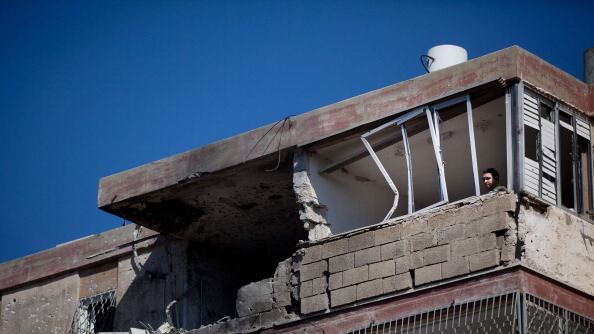Since Israel began its latest military operation in Gaza, many have denied that Hamas provoked this new conflagration. They are wrong. They ignore the increase in the barrage of rockets that pummeled the South of Israel in the days before Operation Pillar of Defense. Hundreds of rockets fell, forcing a huge swathe of Israeli society to hide in bomb shelters with no work or school—crippling for both the economy and the soul. For the citizens of the South, life was becoming intolerable. They demanded action.
There has been lots of talk, suggesting that Operation Pillar of Defense is nothing more than an election campaign for Bibi and Barak. But they didn't start this. Hamas did. The government simply had to react. So the real question is, why did Hamas choose to escalate things now?

Palestinian extremists generally increase their violence before an Israeli election. In 1996, following Yitzhak Rabin’s assassination, Labor expected to be swept to power to finish Rabin’s work. Palestinian terror rose exponentially, driving the electorate toward Netanyahu. In 2001, the second intifada drove the electorate away from Barak and his historic attempt at peace, to Ariel Sharon. And in the winter of 2008, the rocket fire started coming from Gaza, with an eye toward the February 2009 election. Olmert, Barak, and Livni tried showing strength through Operation Cast Lead, but the cycle of violence led the Israeli electorate rightwards once more, ending the reign of the pragmatic Kadima party, and crowning perhaps the most right-wing coalition Israel has ever known.
An intransigently right-wing Israeli government suits Hamas. A government that refuses to negotiate with the Palestinians is what Hamas wants, because they don’t support negotiations, and they don’t want to give Abbas a partner. A radically right-wing Israeli government, preferably with racist undertones, acts as a primary recruiting agent for Hamas and wins supporters for Palestinian radicals all over the world. The last thing Hamas wants is a reasonable Israeli government that will offer peace to the Palestinians. Hamas doesn’t want to live in peace alongside Israel. It wants the destruction of Israel. And Hamas doesn’t want an Israeli government that could be popular in the wider world. Perhaps that’s why the bombs started to fall.
And this is where our leaders lacked imagination. They all fell right into the script that Hamas was writing for them. We seem to be pulled into an unstoppable cycle of death. And in a few years’ time, the rockets will come back again anyway.
What would our leaders do if they had some imagination? Causing the downfall of Hamas is probably beyond us. But we can significantly strengthen Abbas. Abbas, for all of his faults, is a real partner for peace. Any military campaign in Gaza should be offset with support for Abbas. If Abbas were on the threshold of creating a viable Palestinian State in the West Bank, Hamas’s policies would look all the more absurd and masochistic. But as things stand, offering a hand of negotiation to Israel has gotten Abbas nowhere. This Israeli government makes Hamas’s rejectionism seem like the only plausible option. Also, if they had stated clear, achievable military goals before bombing Gaza, we would have a way of ending this thing without making it look like Hamas has somehow won, and without having to commit ground troops.
What’s more, the leaders of the opposition also lacked imagination. What they need to point out is this: Hamas wants us to vote rightwards; they’re bombing us to the ballot box in the hope that we’ll vote in the most reactionary right-wing government possible. The leaders of the left must tell the electorate that the best way to give Hamas a bloody nose is to vote in a government that they’d really hate: a peace-loving, pragmatic government. The left should argue that Netanyahu has, in many ways, strengthened Hamas and weakened Abbas. ‘If we want to beat Hamas,’ they need to be urging us, ‘we all need to take a step to the left.’






